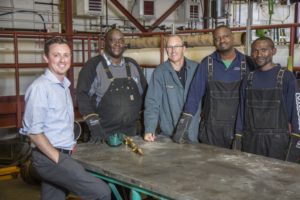Camosun College is in the process of developing a Gas Transmission Technician diploma program. The catch? It’s not going to be taught at Camosun.
Instead, the program will be implemented many time zones away, at Arusha Technical College (ATC) in Tanzania. Camosun chair of Plumbing and Pipe Trades John Gordon says it’s been a great experience to work abroad with academic institutions, but adds that doing so is far from simple or easy.
“When you take it over to another country—especially a third world country—they don’t even have shops, really,” he says. “There’s no equipment, there’s no material to work with. We’re heavily engaged in the kinaesthetic learning process here when we get people out there to touch things… Build things, that’s what we do here at Camosun.”

Gordon says people in Tanzania can be far less fortunate. The trouble is that programs at Camosun—and in North America, for that matter, says Gordon—are designed in such a way that is dependent on having a relatively high number of tools and resources. This is not the case in countries that don’t have as many resources, says Gordon.
“They lecture so heavily because they can’t go to the shop,” he says. “There is no shop. So to transition our program over there, I have to really think about that; I have to really adjust the program to suit the style they have for teaching over there.”
Gordon admits that he’s still working hard figuring out how to do that; even simple things like PowerPoint presentations and learning systems such as D2L presentations are often unavailable at ATC.
“What they really want is a pre-apprenticeship program similar to what we do here in our foundations program for Pipe Trades,” says Gordon. “We’re going to name it something to do with oil and gas, but we’re really going to target sort of a general preparation course for entry-level pipe trades people.”
Nicholaus Mhusa is an instructor from ATC who was training at Camosun. He agrees that there are challenges with getting the program together.
“We are working in a different environment,” he says. “Canada is a developed country with a lot of industry; it is possible for one to specialize in one area and get a job. In Tanzania it’s different; we don’t have many industries. Employers want personnel with multiple skills.”
Gordon says that the process won’t be a quick one, as there will be a lot of work after the program is up and running.
“We have to ensure the program’s aligned with what both governments want, so there will be about a year of follow-up,” says Gordon on what Camosun’s role will be after the program is implemented.
Camosun College Student Society external executive Rachael Grant says partnering with academic institutions overseas can be a great and helpful endeavour for the college, as long as it doesn’t compromise the education that Camosun students get from the institution.
“Overall it’s a really positive thing,” says Grant. “As long as investing resources and time in a partnership overseas doesn’t impact the quality of education that Camosun students receive. It adds value to credentials that Camosun students get here. As long as it’s done with integrity, it’s a very positive thing.”
Mhusa says that ATC benefits a lot from working with Camosun, and hints that there may be more partnerships between the two in the future.
“ During our instructors’ training at Camosun we observed opportunity for more programs,” he says. “We are thinking to have certificate programs like lapidary and jewelry in the field of plumbing, pipe and steam fitter and gas fitter. Demand for these programs is high and justifiable, because Tanzania is a resource-rich but skills-poor country, with idling youths.”
